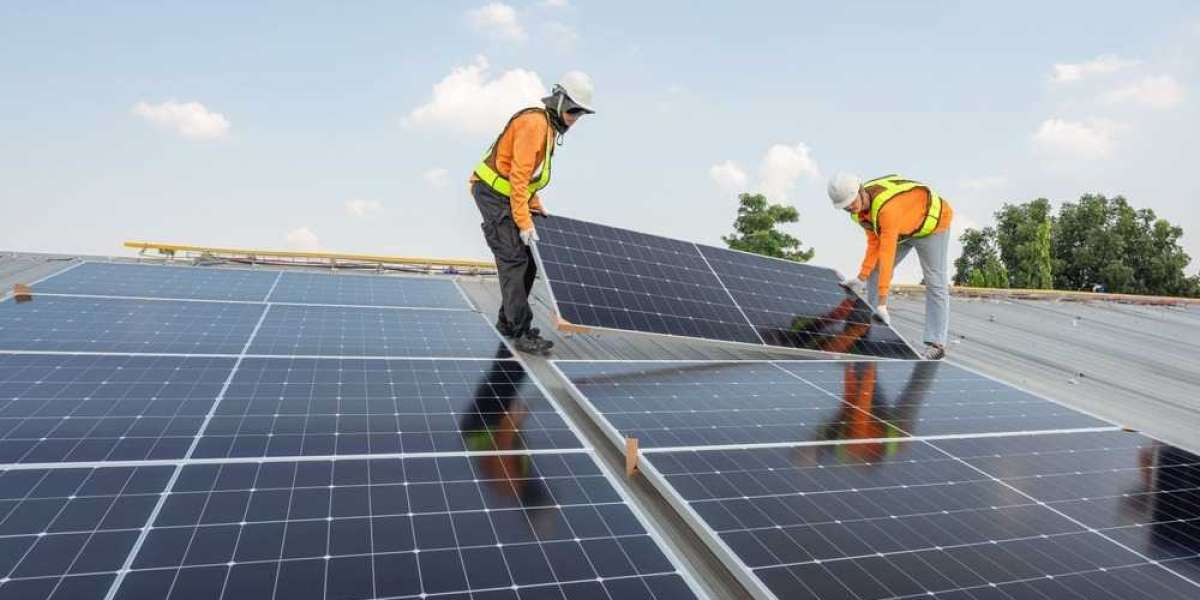As businesses increasingly aim to become more sustainable, the role of commercial solar solutions is gaining importance. With rising energy costs and the need for environmental responsibility, solar energy is proving to be a cost-effective and eco-friendly option for companies. This guide explores how commercial solar systems can revolutionize business energy strategies while promoting long-term sustainability.
Understanding Commercial Solar Solutions and Their Impact
Commercial solar solutions refer to the installation of solar power systems specifically designed for businesses. These systems convert sunlight into electricity using photovoltaic (PV) panels, helping companies generate their own energy and reduce dependence on the grid. By embracing solar energy, businesses can achieve significant cost savings, lower carbon footprints, and enhance their corporate image.
Solar energy is not just for homes or residential buildings. Businesses of all sizes, from small offices to large industrial facilities, can benefit from installing solar panels. With the right solar solution, companies can optimize energy usage and achieve long-term sustainability.
Why Businesses Should Consider Solar Energy
The adoption of commercial solar solutions is not just a trend but a smart investment for businesses. Below are the key reasons why solar energy is becoming essential for businesses:
- Energy cost savings: Commercial solar systems allow companies to reduce their electricity bills by generating free power from the sun.
- Environmental benefits: Solar power is a clean, renewable source of energy that helps businesses reduce their carbon emissions and contribute to environmental protection.
- Energy independence: Relying on solar energy reduces dependence on traditional electricity sources, protecting businesses from fluctuating energy prices.
- Government incentives: Many countries offer tax incentives, rebates, and grants to businesses that invest in solar energy, further enhancing the financial benefits.
How Commercial Solar Solutions Work for Businesses
When a business installs a commercial solar system, the panels capture sunlight and convert it into electricity. This process is managed by photovoltaic cells that use the sun’s rays to create an electric current. The energy generated can either be used directly or stored in batteries for later use.
Key Components of a Commercial Solar System
- Photovoltaic (PV) Panels: These are the primary devices that capture sunlight and generate electricity.
- Inverters: Inverters convert the direct current (DC) produced by solar panels into alternating current (AC), which powers most business operations.
- Battery Storage Systems: For businesses operating during non-sunlight hours, battery storage systems are essential for storing excess energy generated during the day.
- Mounting Systems: These ensure the solar panels are securely installed, typically on the roof or other large, open spaces.
- Monitoring Systems: These track the solar system's performance and energy output, allowing businesses to monitor savings and adjust their energy use accordingly.
Types of Commercial Solar Solutions
There are various types of commercial solar solutions, and selecting the right one depends on the specific needs and energy requirements of a business. Below are some common types of systems:
Grid-Tied Systems
A grid-tied solar system is connected to the public electricity grid, allowing businesses to supplement their solar energy production with traditional grid electricity when needed. These systems are ideal for businesses looking to reduce energy costs without completely disconnecting from the grid.
Off-Grid Systems
Off-grid systems are fully independent and rely solely on the energy generated by solar panels and stored in batteries. These solutions are perfect for businesses in remote locations where grid access is limited or non-existent.
Hybrid Solar Systems
Hybrid systems combine the benefits of both grid-tied and off-grid systems. They allow businesses to store excess solar energy in batteries while still being connected to the grid for backup. Hybrid systems provide flexibility and energy security, making them a popular choice among companies.
Factors to Consider Before Installing Commercial Solar Solutions
Choosing the right commercial solar solution involves careful planning and evaluation. Here are some critical factors businesses need to consider:
Energy Consumption
Understanding current energy usage is vital to designing a solar system that meets a company’s needs. Businesses should review their electricity bills and assess their peak usage times to determine the appropriate size of the solar system.
Location and Sunlight Exposure
The location of the business and the amount of sunlight it receives directly impact the efficiency of solar panels. Businesses in areas with high sun exposure will benefit more from solar energy. Shaded areas or frequent cloudy weather can reduce the system's effectiveness.
Roof Space and Structural Integrity
Most commercial solar systems are installed on rooftops. Therefore, it's essential to assess whether the building has enough space and structural integrity to support the panels. Large industrial buildings are ideal for solar installations due to their extensive rooftop space.
Budget and Financing Options
The cost of installing commercial solar solutions can vary depending on the system's size and complexity. However, businesses don’t have to bear the entire cost upfront. Many financing options are available, including solar leases, power purchase agreements (PPAs), and government incentives, making solar energy affordable for companies of all sizes.
Government Incentives and Financial Benefits
Governments across the globe are encouraging businesses to adopt solar energy by offering attractive financial incentives. These benefits include tax credits, rebates, and accelerated depreciation schemes that can significantly reduce the upfront cost of installing commercial solar solutions.
In addition, many countries have net metering policies that allow businesses to sell excess energy back to the grid, further boosting their return on investment.
Tax Credits and Rebates
In many countries, businesses can claim tax credits for installing solar panels. These credits reduce the amount of tax owed, making the switch to solar energy financially appealing.
Energy Efficiency Grants
Several governments and environmental organizations provide grants to help businesses cover the cost of transitioning to renewable energy sources like solar power. By applying for these grants, businesses can make their solar projects more affordable.
The Long-Term Advantages of Commercial Solar Solutions
Adopting commercial solar solutions offers long-term benefits that go beyond just energy savings. By investing in solar energy, businesses gain a competitive edge in today’s eco-conscious marketplace. Here’s why solar energy is crucial for business success:
Corporate Social Responsibility (CSR)
Today, consumers and stakeholders are more likely to support businesses that demonstrate a commitment to sustainability. Installing a commercial solar system sends a powerful message about a company’s dedication to environmental responsibility, enhancing its corporate image and brand reputation.
Resilience Against Rising Energy Costs
As fossil fuel prices continue to rise, businesses relying on traditional energy sources face unpredictable costs. With solar energy, companies can stabilize their energy expenses and protect themselves from future price fluctuations.
Scalability and Flexibility
Solar systems are highly scalable, allowing businesses to expand their solar capacity as their energy needs grow. Whether it's for a small office or a large manufacturing plant, solar energy can be tailored to meet any business’s requirements.
DSG Energy is committed to transforming the energy landscape in Pakistan by promoting the adoption of commercial solar solutions. With their advanced grid-tied solar system installations, they help businesses reduce energy consumption, ensuring cleaner air and greater energy independence. By embracing renewable energy, DSG Energy enables companies to achieve long-term savings, reduce their reliance on foreign energy sources, and enhance the reliability of the electricity grid. Their innovative approach is paving the way for a more sustainable and efficient future in Pakistan's business sector.
Planning for the Future with Commercial Solar Solutions
Commercial solar solutions not only help businesses save money but also position them as leaders in sustainability. As the world transitions to cleaner energy, businesses that invest in solar power today will be better equipped to thrive in the future.
Solar energy is more than a trend; it is the key to a sustainable and energy-efficient future for businesses. By making the switch to commercial solar, companies can reduce their environmental impact, achieve long-term savings, and demonstrate leadership in corporate sustainability.








